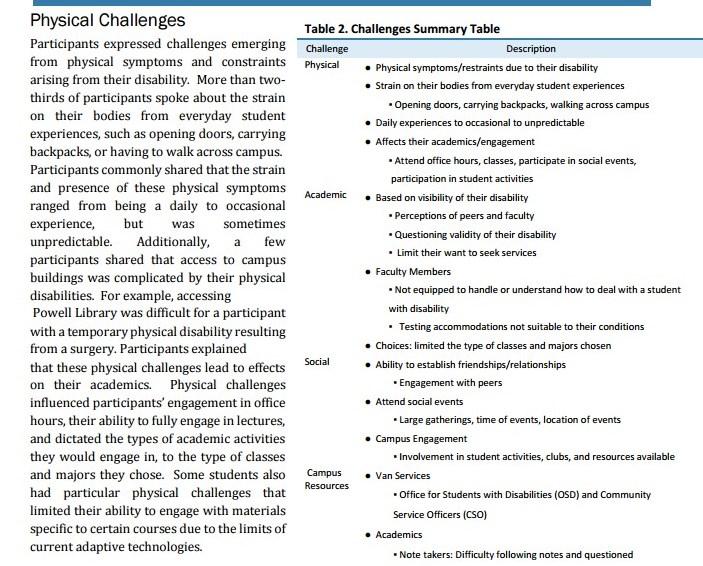Read full report
Why did we explore the experiences of students with disabilities?
Data from the UC system-wide climate survey (2011) revealed less favorable outcomes for students with disabilities. As part of UCLA’s action plan for improvements, SAIRO was tasked with conducting a qualitative study to further explore the experiences of students with disabilities at UCLA. Interviews addressed areas of climate, challenges, sources of support, and recommendations from the students while pursuing their academic success at UCLA. Students discussed their individual experiences as well as how they perceived and understood the attitudes, behaviors and standards of faculty, staff, administrators and other students. This brief explores in more detail findings related to challenges and the recommendations of students as revealed in interview data.

What did we find?
Analysis revealed the following key findings:
• Students face strain on their bodies from everyday student experiences resulting in daily, occasional, or unpredictable physical challenges. These physical challenges affect their academic pathways and their ability to fully engage in academic and extracurricular activities.
• Variations in the visibility of a student’s disability often resulted in others’ questioning the validity of the disability. Perceptions of unfair advantage and cheating held by peers and faculty limited students’ desire to seek resources and services, ultimately having negative academic consequences.
• Students also faced various social challenges. Students had difficulty establishing friendships, attending social events, and engaging with the campus social environment. Students identified challenges with campus resources. These challenges included difficulty accessing particular resources (e.g., van services, note taking services). In addition, variation in awareness of available resources and unclear understanding of roles between the institution and students in the advocacy for assistance or accommodation also contributed to student challenges.
• Five overarching participant recommendations were identified: 1) improve van services, 2) institute faculty training on Students with Disabilities, 3) expand testing accommodations/ options, 4) improve food labeling, and 5) increase publicized information about available resources.
How can the findings inform practice?
As a result of these findings, institutionalized training programs for faculty and staff should be created to educate them on the needs of students with disabilities. These trainings should focus on educating the UCLA community on various types and forms of disabilities, adaptive academic accommodations and options, and how to interact with students with disabilities. Additionally, an expansion in marketing and publicized information on the resources available for students with disabilities is necessary. Through these specific recommendations, student and faculty interactions can improve and students can become familiar with the available resources on campus.
Did you know you can request customized data used in this report?
Use SAIRO's Data Request Form to get started on data to answer your assessment questions.